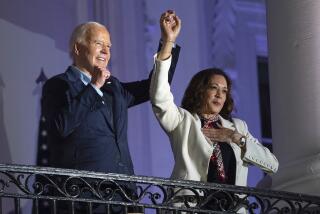Shrinking Independents Hold Power to Decide Close Elections
- Share via
WASHINGTON — When President Bush swooned in the polls this winter, the growing doubts of independent voters were the leading cause.
If public opinion swings the other way -- as it usually does during an election year -- independents again will lead the way.
Presidential campaign strategists talked a great deal in the last year about the importance of motivating their base voters. The number of independents has shrunk a bit since the 1990s, down to 10% to 15% of the electorate. But independents -- those 10 million to 15 million voters who don’t lean strongly toward either party -- still hold the power to decide a close election.
Independents are often women of lower and middle income who decide whom to support very late in the campaign, political analysts say. Voters are likely to perceive that this election is about big issues such as the war in Iraq and a struggling economy, said voter specialist Curtis Gans, and that should draw plenty of independents to vote.
Any talk of focusing on base voters at the expense of appealing to independents is “wishful thinking,” says political scientist James Thurber of American University. The campaigns still have to do both, he said.
The fierce loyalty of conservatives and Republicans to the president and the ability of Howard Dean to bring new people into his Democratic campaign have heightened the emphasis on campaigns attracting base voters over those targeting independents from the political middle.
But the dramatic shift in the polls in January offer a clear reminder of the power of independents.
Bush’s job approval dipped into the high 40s in several polls at the end of January and start of February, including 47% in the AP-Ipsos poll.
His approval among independents in a tracking poll by the National Annenberg Election Survey dipped sharply from 61% in late January after outgoing Iraq weapons advisor David Kay said he doubted weapons of mass destruction existed in Iraq before the war.
By last weekend, Bush’s approval among independents in that poll was 52%.
Early this month in an AP-Ipsos poll, independents said by a 2-1 margin they would definitely vote for another candidate rather than definitely vote for the president. A majority said the country was headed down the wrong track.
Independents said in a CNN-Time poll released last weekend that they were more likely to have doubts and reservations about Bush than trust him by a 61-38 margin.
Still, the nature of independents is to swing back and forth. By late last week, independents were almost evenly split in an ABC-Washington Post poll on the question of whether Bush is trustworthy -- a longtime strength of the president.
Political pollsters like Democrat Celinda Lake and Republican Bill McInturff say independents play at least as important a role as base voters in a closely divided nation.
“If both parties spend enormous amounts to balance out those two extremes, that group in the middle will still make a world of difference,” said McInturff.
Princeton political scientist Larry Bartels says it’s a simple question of math.
“Convincing someone who is for you to turn out increases your vote margin by one,” says Bartels, a presidential campaign specialist. “Convincing someone who was going to vote for the other guy to vote for you increases your vote margin by two.”
And Bartels believes 10% to 15% of voters will enter the closing weeks of the campaign genuinely undecided.
One of those true independents is Deborah Babine, 46, a registered nurse from South Portland, Maine. She’s closely watching the campaign and says she’s far more interested in what the candidates have done in the past than on what they say on the campaign trail.
In the meantime, Babine relishes her independent status.
“I’m not one that is good at commitment,” she said, “one way or the other.”
More to Read
Get the L.A. Times Politics newsletter
Deeply reported insights into legislation, politics and policy from Sacramento, Washington and beyond. In your inbox twice per week.
You may occasionally receive promotional content from the Los Angeles Times.










